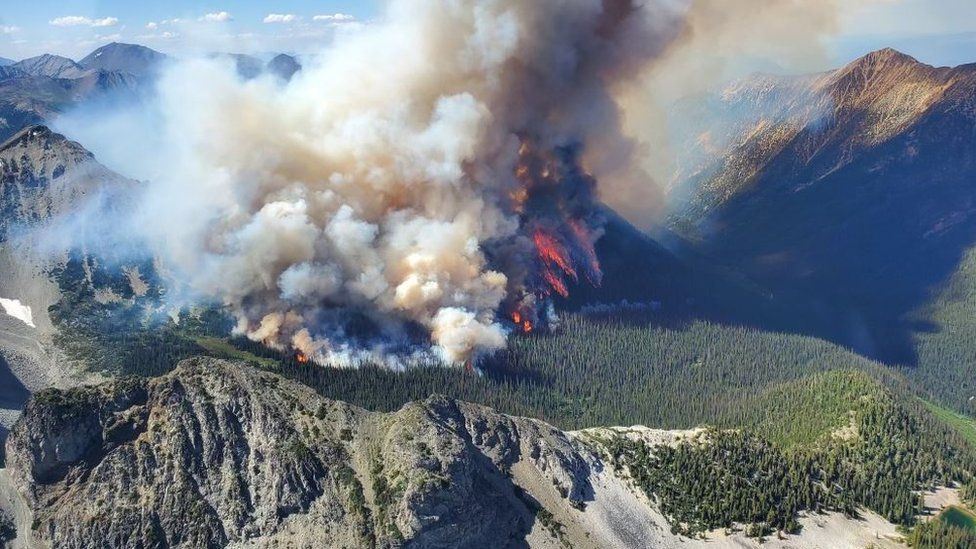
IMAGE SOURCE,BRITISH COLUMBIA WILDFIRE SERVICE
The latest extreme weather comes as Canada battles the worst wildfire season it has ever seen
By Max Matza
BBC News, Seattle
Canada's farthest northern regions are seeing an unprecedented heat wave leading to some of the hottest days ever recorded.
The temperatures over the weekend in the Northwest Territories smashed previous records, weather experts say.
The latest extreme weather comes as Canada battles the worst wildfire season it has ever seen. Millions have been impacted by the harmful smoke.
Unofficial records show Earth saw it's highest ever temperatures on Thursday.
The global average of 17.32C (63.17F) for the planet came after the single-day record was surpassed twice earlier that same week.
With a Saturday temperature of 37.4C, Fort Good Hope in the Northwest Territories (NWT) saw "the hottest temperature recorded that far north in Canada," says Environment Canada meteorologist Jesse Wagar.
"Each summer is just getting hotter and hotter," says Ms Wagar.
Of the top five temperatures ever recorded in the NWT, four occurred in the past eight years, she says. Three of those were in the last three summers.
With a temperature of 37.9C (100.2F), the mercury in the community of Norman Wells just south of Fort Good Hope was just 0.1C lower than the hottest temperature recorded for the near-Arctic region, extreme-weather historian Christopher Burt told BBC News.
The reading there was just shy of the record set at a similar latitude in Verkhoyansk, Russia, in June 2020 of 38C.
According to Ontario-based Weather Network, Ottawa's all-time high temperature is 37.8C - meaning that the temperature in Norman Wells was higher than the highest record seen in a city with a latitude 1,400 miles (2,250) to its south.
"These temperature records aren't just sneaking by," says Ms Wagar, adding that they have smashed the previous records "often by several degrees".
This latest heat wave has attracted a lot of attention, but "May, June and July have all seen pretty incredible temperature records and temperature records are falling at a pretty significant rate", she says.
In the first nine days of July the NWT has already seen 17 temperature records broken. In July of last year, 18 records were broken. In June 2023, 24 records were broken, compared to four in June 2022.
The heat wave affecting Canada's north is expected to begin to cool on Wednesday, according to Environment Canada. But temperatures are still forecast to remain dangerously high.
Some experts say climate change is causing the Arctic to warm two-to-four times faster than the rest of the planet.
BBC News, Seattle
Canada's farthest northern regions are seeing an unprecedented heat wave leading to some of the hottest days ever recorded.
The temperatures over the weekend in the Northwest Territories smashed previous records, weather experts say.
The latest extreme weather comes as Canada battles the worst wildfire season it has ever seen. Millions have been impacted by the harmful smoke.
Unofficial records show Earth saw it's highest ever temperatures on Thursday.
The global average of 17.32C (63.17F) for the planet came after the single-day record was surpassed twice earlier that same week.
With a Saturday temperature of 37.4C, Fort Good Hope in the Northwest Territories (NWT) saw "the hottest temperature recorded that far north in Canada," says Environment Canada meteorologist Jesse Wagar.
"Each summer is just getting hotter and hotter," says Ms Wagar.
Of the top five temperatures ever recorded in the NWT, four occurred in the past eight years, she says. Three of those were in the last three summers.
With a temperature of 37.9C (100.2F), the mercury in the community of Norman Wells just south of Fort Good Hope was just 0.1C lower than the hottest temperature recorded for the near-Arctic region, extreme-weather historian Christopher Burt told BBC News.
The reading there was just shy of the record set at a similar latitude in Verkhoyansk, Russia, in June 2020 of 38C.
According to Ontario-based Weather Network, Ottawa's all-time high temperature is 37.8C - meaning that the temperature in Norman Wells was higher than the highest record seen in a city with a latitude 1,400 miles (2,250) to its south.
"These temperature records aren't just sneaking by," says Ms Wagar, adding that they have smashed the previous records "often by several degrees".
This latest heat wave has attracted a lot of attention, but "May, June and July have all seen pretty incredible temperature records and temperature records are falling at a pretty significant rate", she says.
In the first nine days of July the NWT has already seen 17 temperature records broken. In July of last year, 18 records were broken. In June 2023, 24 records were broken, compared to four in June 2022.
The heat wave affecting Canada's north is expected to begin to cool on Wednesday, according to Environment Canada. But temperatures are still forecast to remain dangerously high.
Some experts say climate change is causing the Arctic to warm two-to-four times faster than the rest of the planet.
Climate change destroying homes across Arctic
Meanwhile, Canada's unprecedented wildfire season continues to worsen.
In a briefing last week, officials said that 639 active fires are burning across Canada, with 351 burning out of control.
An unprecedented number of residents have been forced to flee, said the Canadian Forest Service.
South of the NWT, hundreds of lightning strikes over the weekend tripled the number of fires burning in British Columbia.
On Monday the province announced that it was banning all campfires in an effort to prevent human-caused blazes.
No comments:
Post a Comment